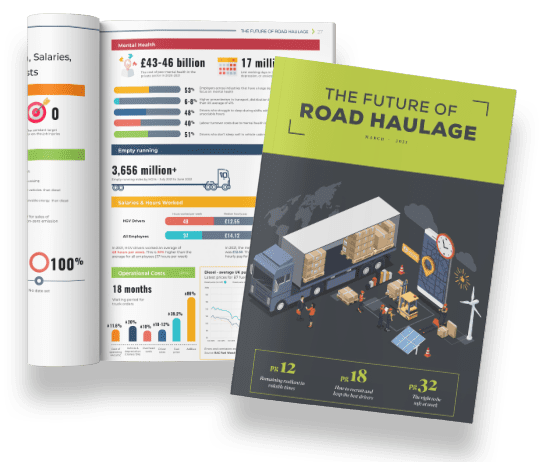HGV drivers and mental health: Looking after your drivers
The importance of mental health as an essential aspect of every person’s overall well-being is increasingly recognised, and in recent years there has also been a growing focus on mental health in the workplace. Poor mental health affects not only the employees, but also their families, employers, and the state.
Low levels of well-being for truck drivers in particular can lead to unsafe driving, whereas employees who manage their mental well-being proactively are better able to perform at their best and safely.
Investing in mental health
A 2022 Deloitte report on mental health and employers emphasises that investing in employee mental health is a moral and a business imperative. Despite the slow recovery from the worst of the pandemic, poor mental health continues to affect work attitudes and performance. The report estimates the overall annual cost of poor mental health to private sector businesses in 2020-2021 at £43-46 billion. This represents the combined costs of absenteeism, presenteeism, and labour turnover, with nearly 40% of total labour turnover costs attributed to mental health issues.
It’s encouraging then that the 2022 Health and Wellbeing at Work report of the Chartered Institute of Personnel and Development (CIPD) showed that, similar to their findings in 2021, mental health remains the most common priority that organisations with well-being activity aim to promote. 53% of survey respondents from across industries said their efforts focus on mental health specifically ‘to a large extent’.
HGV drivers lagging behind the post-pandemic improvement
While the increased focus on mental health in general has led to more resources and support being dedicated towards mental health programmes, it seems HGV drivers have yet to experience the benefits of these.
Most industries have shown improvement in mental health since the height of the pandemic. However, there are two sectors that still need to catch up with the recovery experienced in other industries – health being one, and transport, distribution and storage the other.
It is well known that the tough demands and some of the more challenging aspects of working as an HGV driver can take their toll on drivers’ mental health. This is compounded by misconceptions about mental health and stereotyped attitudes about treatment, which means that people often suffer in silence. Conditions and issues that could be treated effectively with early intervention or prevention strategies just end up worsening.
According to the Health and Safety Executive, stress, depression, or anxiety led to a total of 17 million working days lost in the UK in 2021/22, accounting for 51% of work-related ill health for this period. But considering the driver shortage, it’s hardly surprising that transport, distribution and storage came out as one of the sectors with the highest levels of presenteeism (being at work despite feeling ill with poor mental health and consequently not performing at full ability). The sector ranked 6-8% higher for presenteeism than the UK employee average of 41%.
The figures make it clear that it’s critical to make employee mental health a key priority, especially for lorry drivers.
What are the challenges that drivers face?
HGV drivers face a set of challenges unique to their profession, including:
- Long periods of isolation on the road and time away from family
- Dealing with traffic jams and unforeseen issues on the roads, such as road closures or construction
- Being on the receiving end, daily, of the general public’s hostility and impatience
- High-pressure delivery requirements due to the ongoing driver shortage
- Long queues at ports post-Brexit
- Having to rely on inadequate facilities at truck stops
As a consequence, and as confirmed by research such as a 2019 paper Steering towards happiness: An experience sampling study on the determinants of happiness of truck drivers, truck drivers are at high risk for anxiety, depression, and fatigue due to the high demands of the job. The prospect of long hours and low levels of work satisfaction has also been cited as a contributing factor in the current driver shortage facing the UK.
Data on employees’ own accounts of how they’re feeling shows that employees working in the transportation sector score well below average on life and job satisfaction. A survey by Employ Recruitment found that HGV drivers struggle to sleep, both on and off the job. In the survey, 51% of drivers agreed that they don’t sleep well in the vehicle cabin. 48% said they struggle to sleep when doing shifts with unsociable hours.
Alarmingly, UK mental health charity, Mates in Mind, revealed that van drivers have a 25% higher suicide rate than the national average, and drivers of heavy goods vehicles have a 20% higher rate than the national average.
A collective approach goes further
Implementing systems that reduce avoidable frustrations for drivers is a great place to start. But it’s also important to go further. A 2022 article by TCI Transportation stated that many drivers want to be home more, be able to maintain a social life, and even start a family.
Some of the ways that transport operators adjusted to accommodate the home-life demands, as mentioned in the article, are:
- Guaranteed daily and/or weekly home time OR a minimum number of days off every year.
- Created routes with longer ‘out’ and ‘home’ times, for example, being out for 7 days and then at home for 4 days.
In another recent article, former Senior Traffic Commissioner Beverley Bell has called for employers to agree to a code of conduct for the treatment of their drivers. Bell states that drivers just want to be respected. Sadie Weston, MD of Employ Recruitment said, “The driver crisis has happened already, this is being addressed. What isn’t being addressed enough collectively is their working conditions which will ultimately help with driver retention.”
The Road Haulage Association provides mental health and first-aid training in a one-day course that empowers attendees to identify early warning signs of mental health issues, gain insights into how to build a healthy workplace, and how to support colleagues and employees who are experiencing mental health problems. They also have a two-day, more in-depth course that covers mental health issues and how they affect the workplace and how to build support resources within an organisation.
The UK Department for Transport (DfT) recently launched the HGV parking and driver welfare grant scheme. The scheme provides match funding up to £315,000 per site to help improve HGV driver welfare. Specific areas earmarked for improvement include:
- Toilets, shower facilities, and rest areas;
- Security, including lighting systems, CCTV and monitoring equipment, secure fencing; and
- HGV parking capacity, specifically spaces and layout.
What can employers do to tackle these challenges?
The pandemic seems to have contributed to a greater understanding of employee mental health. Employers should build on these insights to put sustainable programmes, interventions, and technology in place to help employees who are struggling with poor mental health.
Interventions don’t always have to be dramatic or costly. In an industry where profit margins are already slim, don’t discount the meaningful impact the simplest things can have.
Even increasing business process efficiency, thereby reducing everyday frustration, can make a significant difference. How employers treat their drivers, and the systems in place to take care of stress-causing issues so drivers can focus on their job, go a long way towards helping them feel more fulfilled in their jobs.
Consider the following:
- Stay connected with drivers. Keep in touch with drivers outside of regular dispatch interactions. Ask them to share insights into their well-being and provide a safe space, such as a mental health support line, to voice issues or concerns. This in turn will provide the company with valuable feedback which they can turn into interventions.
- Give drivers the tools they need to succeed. Having the right technology in place can ease the admin and subsequent mental load. As an example, hauliers that are investing in a transport management system or transport management software (TMS), are able to simplify many of their processes, which alleviates much of the frustration and stress that drivers face. Integrated driver mobile apps make it easy for transport managers to manage schedules, communicate updates, and make real-time changes to journeys, helping drivers to avoid frustrating and mentally draining journeys. Similarly, electronic proof of delivery (ePOD) apps reduce the stress of losing paper PODs or manually completing them when they are exhausted after a long haul. ePODs also put an end to unnecessary delays waiting for signed paper delivery notes. Using specialised satnav tools for lorries that enable truck-aware routing, instead of car satnavs, can prevent drivers getting stuck on narrow roads or under bridges and contributing to road congestion.
- Optimise delivery routes. Proper route planning can dramatically reduce the time drivers spend stuck in traffic or on bad routes, all of which cause frustration that builds up over time. It can also ensure better distribution of work among drivers.
- Tools to support drivers’ families. The Deloitte survey showed that respondents in the transport, distribution and storage sector (along with those in the health and education sectors) felt a need for their employers to also help equip them to provide support for f friends and family. Long work hours and times away from home mean their families and social lives also suffer.
- Mental health awareness training for managers as well as digital mental health support tools could ensure that support occurs at all levels and on a continuous basis.
Well-being benefits everyone
Driver sick days and high driver turnover levels can adversely affect a haulage company’s competitiveness through disrupted delivery services, vehicle downtime, and recruiting costs. A key to the survival of transport operators is their ability to retain good, qualified drivers.
By taking care of the mental well-being of their drivers and using government, technology, and other resources available, they can keep their best employees on the road for many years to come.
As a spin-off, this may even paint the industry in a more positive light and attract a whole new generation of drivers, eventually helping to reduce the ongoing driver shortage.
The Future of Road Haulage Report
This article is part of our recently published report, The Future of Road Haulage. Offering a comprehensive industry trends analysis, insights, and advice from industry thought leaders, The Future of Road Haulage equips businesses with the knowledge to make informed decisions and stay ahead in a rapidly evolving landscape.

